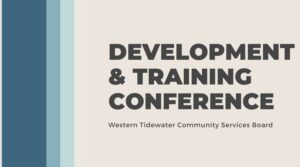Western Tidewater and Region V Training Events


Grab your resume and swing by our Recruitment and Benefits Fair for instant interviews and a peek at all the awesome perks waiting for you at Western Tidewater Community Services Board. Date: May 1, 2024 Open Positions: RSVP to secure your spot today! TOPICS COVERED in Youth MHFA Date: May 2nd, 2024 Youth Mental Health First Aid is primarily designed for adults who regularly interact with young people. The course introduces common mental health challenges for youth, reviews typical adolescent development, and teaches a 5-step action plan for how to help young people in both crisis and non-crisis situations. Topics covered include anxiety, depression, substance use, disorders in which psychosis may occur, disruptive behavior disorders (including AD/HD), and eating disorders. This training has reached capacity. Please visit our calendar for other MHFA training opportunities. Grab your resume and swing by our Recruitment and Benefits Fair for instant interviews and a peek at all the awesome perks waiting for you at Western Tidewater Community Services Board. Date: May 9, 2024 Open Positions: RSVP to secure your spot today! REVIVE! is the Opioid Overdose and Naloxone Education (OONE) program for the Commonwealth of Virginia. REVIVE! provides training on how to recognize and respond to an opioid overdose emergency using naloxone. Date: May 22nd, 2024 This training covers understanding opioids, how opioid overdoses happen, risk factors for opioid overdoses, and how to respond to an opioid overdose emergency with the administration of Naloxone*. Since 2013, fatal drug overdose has been the leading method of unnatural death in Virginia, surpassing all other forms of unnatural death including homicide, suicide, motor vehicles accidents, and undetermined deaths. Opioids have been the driving force behind the large increases in fatal overdoses since 2013. In 2019, there were 1,289 deaths from all-opioids which includes all versions of fentanyl, heroin, prescription opioids and U-47700 (an illicitly manufactured synthetic opioid). (OCME Quarterly Report) https://dbhds.virginia.gov/ *The basic REVIVE! Training is not sufficient for First Responders and will not qualify you for “No Cost Naloxone”. Please click the link below for information on our First Responder’s REVIVE! Training. First Responders include (Law enforcement, EMS, Fire Dept., Regional Jails, Probation and Parole, Forestry, Military, Juvenile Justice, Court Services, State Parks, and Correctional Facilities.) Adverse childhood experiences, or ACEs, are potentially traumatic events that occur in childhood (0-17 years). For example: experiencing violence, abuse, or neglect, witnessing violence in the home or community, having a family member attempt or die by suicide. Also included are aspects of the child’s environment that can undermine their sense of safety, stability, and bonding, such as growing up in a household with: substance use problems, mental health problems, instability due to parental separation or household members being in jail or prison. Join us for an in-depth discussion as we talk about ways to combat Adverse Childhood Experiences. Date: June 5th, 2024 ACEs are common. About 61% of adults surveyed across 25 states reported they had experienced at least one type of ACE before age 18, and nearly 1 in 6 reported they had experienced four or more types of ACEs. Preventing ACEs could potentially reduce many health conditions. For example, by preventing ACEs, up to 1.9 million heart disease cases and 21 million depression cases could have been potentially avoided. Some children are at greater risk than others. Women and several racial/ethnic minority groups were at greater risk for experiencing four or more types of ACEs. ACEs are costly. The economic and social costs to families, communities, and society totals hundreds of billions of dollars each year. A 10% reduction in ACEs in North America could equate to an annual savings of $56 billion. ACEs can have lasting, negative effects on health, well-being, as well as life opportunities such as education and job potential. These experiences can increase the risks of injury, sexually transmitted infections, maternal and child health problems (including teen pregnancy, pregnancy complications, and fetal death), involvement in sex trafficking, and a wide range of chronic diseases and leading causes of death such as cancer, diabetes, heart disease, and suicide. ACEs and associated social determinants of health, such as living in under-resourced or racially segregated neighborhoods, frequently moving, and experiencing food insecurity, can cause toxic stress (extended or prolonged stress). Toxic stress from ACEs can negatively affect children’s brain development, immune systems, and stress-response systems. These changes can affect children’s attention, decision-making, and learning. Children growing up with toxic stress may have difficulty forming healthy and stable relationships. They may also have unstable work histories as adults and struggle with finances, jobs, and depression throughout life. These effects can also be passed on to their own children. Some children may face further exposure to toxic stress from historical and ongoing traumas due to systemic racism or the impacts of poverty resulting from limited educational and economic opportunities. This training will provide the following: Date: June 11, 2024 TOPICS COVERED in MHFA Date: June 14th, 2024 Mental Health First Aid is a course that teaches you how to identify, understand and respond to signs of mental illnesses and substance use disorders. The training gives you the skills you need to reach out and provide initial help and support to someone who may be developing a mental health or substance use problem or experiencing a crisis. Teachers, first responders and veterans. They’re neighbors, parents and friends. They’re people in recovery, and those supporting a loved one. They’re First Ladies and Mayors. Mental Health First Aiders are anyone who wants to make their community healthier, happier and safer for all. More than 2.5 million people across the United States have been trained in Mental Health First Aid by a dedicated base of more than 15,000 Instructors. Most of us would know how to help if we saw someone having a heart attack—we’d start CPR, or at the very least, call 9-1-1. But too few of us would know how to respond if we saw someone having a panic attack or if we were concerned that a friend or co-worker might be showing signs of alcoholism. Mental Health First Aid takes the fear and hesitation out of starting conversations about mental health and substance use problems by improving understanding and providing an action plan that teaches people to safely and responsibly identify and address a potential mental illness or substance use disorder. When more people are equipped with the tools they need to start a dialogue, more people can get the help they need. Mental Health First Aiders are a vital link between someone experiencing a mental health or substance use challenge and appropriate supports. REVIVE! is the Opioid Overdose and Naloxone Education (OONE) program for the Commonwealth of Virginia. REVIVE! provides training on how to recognize and respond to an opioid overdose emergency using naloxone. Date: June 20th, 2024 This training covers understanding opioids, how opioid overdoses happen, risk factors for opioid overdoses, and how to respond to an opioid overdose emergency with the administration of Naloxone*. Since 2013, fatal drug overdose has been the leading method of unnatural death in Virginia, surpassing all other forms of unnatural death including homicide, suicide, motor vehicles accidents, and undetermined deaths. Opioids have been the driving force behind the large increases in fatal overdoses since 2013. In 2019, there were 1,289 deaths from all-opioids which includes all versions of fentanyl, heroin, prescription opioids and U-47700 (an illicitly manufactured synthetic opioid). (OCME Quarterly Report) https://dbhds.virginia.gov/ *The basic REVIVE! Training is not sufficient for First Responders and will not qualify you for “No Cost Naloxone”. Please click the link below for information on our First Responder’s REVIVE! Training. First Responders include (Law enforcement, EMS, Fire Dept., Regional Jails, Probation and Parole, Forestry, Military, Juvenile Justice, Court Services, State Parks, and Correctional Facilities.)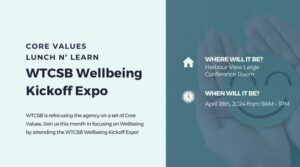
Looking for a career?
Time: 9:00 AM – 1:00 PM (EST)
Location: 7025 Harbour View Blvd, Suite 119
Suffolk, VA 23435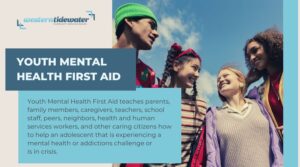
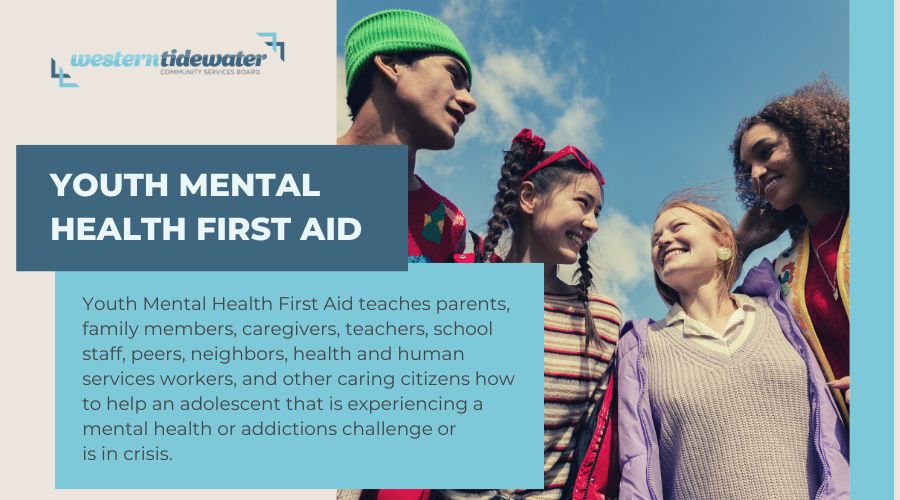
Youth Mental Health First Aid is designed to teach parents, family members, caregivers, teachers, school staff, peers, neighbors, health and human services workers, and other caring citizens how to help an adolescent (age 12-18) who is experiencing a mental health or addictions challenge or is in crisis.
Time: 9:00am-2:00pm (EST)
Location: HARBOUR VIEW Mental Health Center – 7025 Harbour View Blvd, Suite 119, Suffolk, VA 23435
Trainers: Angela BrownRegister Here:
Looking for a career?
Time: 1:00 PM – 5:00 PM (EST)
Location: 135 S. Saratoga Street
Suffolk, VA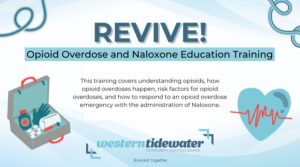
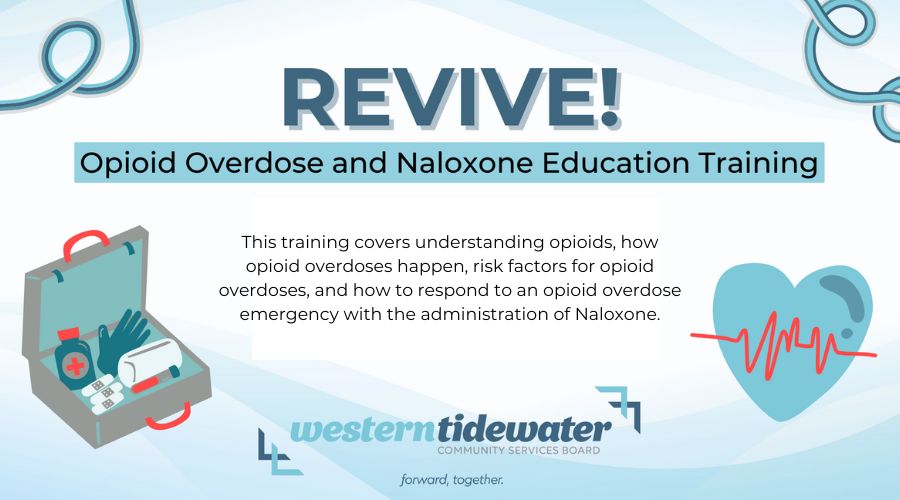
Time: 12:00pm-1:00pm (EST)
Location: Online via Zoom
Trainers: Samantha ScherbinskiRegister Here:
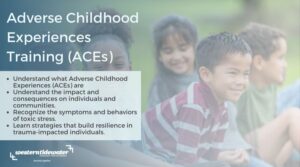
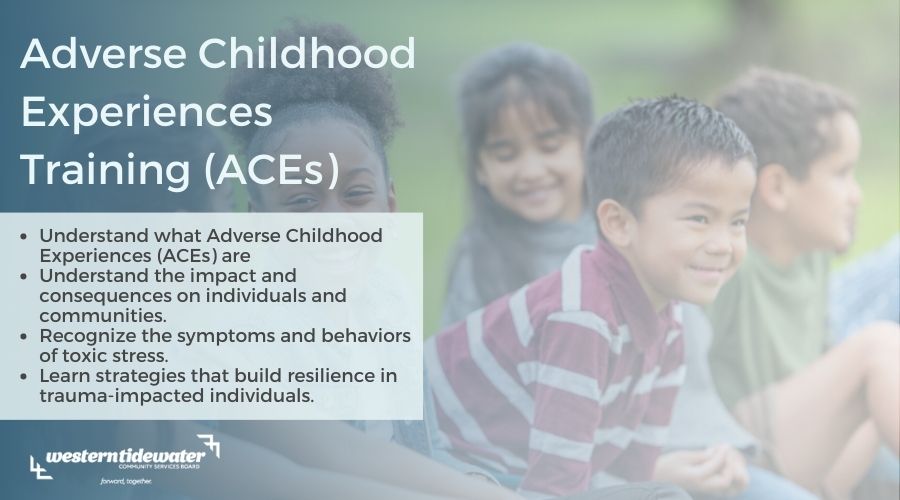
What are adverse childhood experiences?
Time: 10:00 AM – 2:00 PM (EST)
Location: Smithfield Center – 220 N Church St, Smithfield, VA 23430
Presented by: Angela BrownThis training will:
How big is the problem?
What are the consequences?
Register Here:
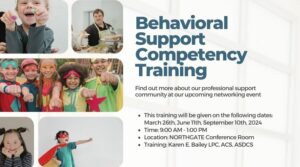
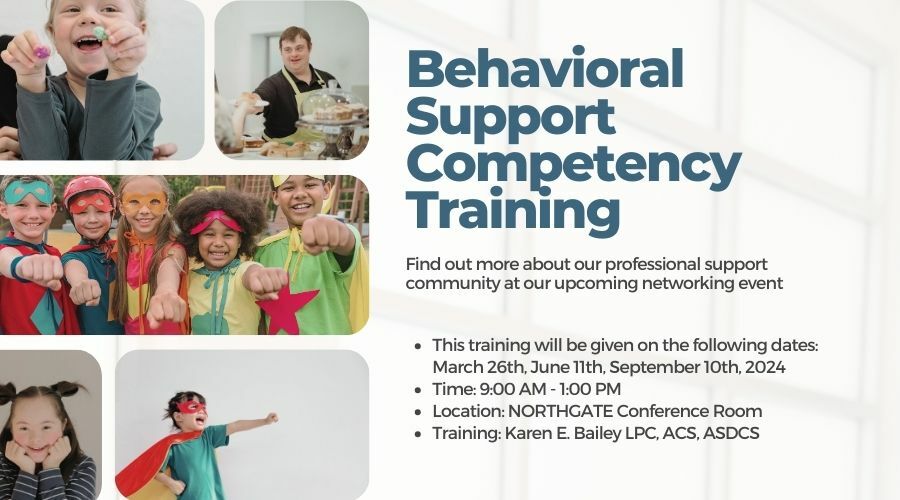
This training is to help staff that work daily with clients with Intellectual Disability and Autism Spectrum Disorder.
Time: 9:00 AM – 1:00 PM (EST)
Location: Northgate WTCSB Conference Room – 1000 Commercial Lane Suffolk, VA 23434
Presented by: Karen E. Bailey LPC, ACS, ASDCSRegister Here:
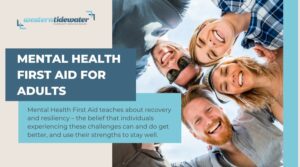
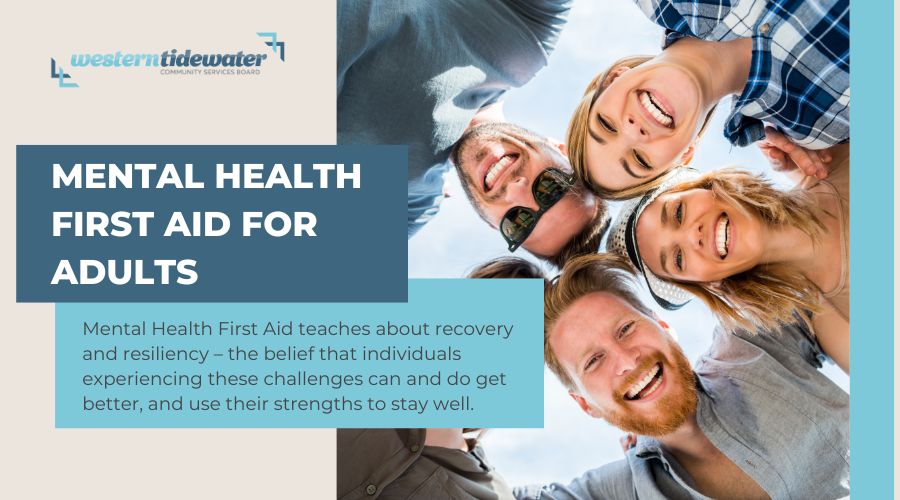
Mental Health First Aid teaches about recovery and resiliency – the belief that individuals experiencing these challenges can and do get better, and use their strengths to stay well.
Time: 9:00 pm – 5:00 pm
Location: SENTARA OBICI HOSPITAL – 2800 Godwin Blvd, Suffolk VA 23434, Ground floor classrooms A/B
Trainers: DeMari Turner and Brian Van der LindenWhat is Mental Health First Aid?
Mental Health First Aiders are…
Mental Health First Aid Matters
Register Here:


Time: 5:00pm-6:00pm (EST)
Location: Franklin Food Bank – 618 South St, Franklin VA 23851
Trainers: Keira MajeedRegister Here:






